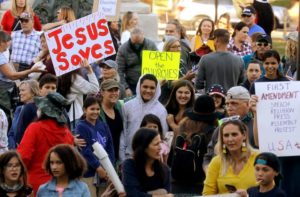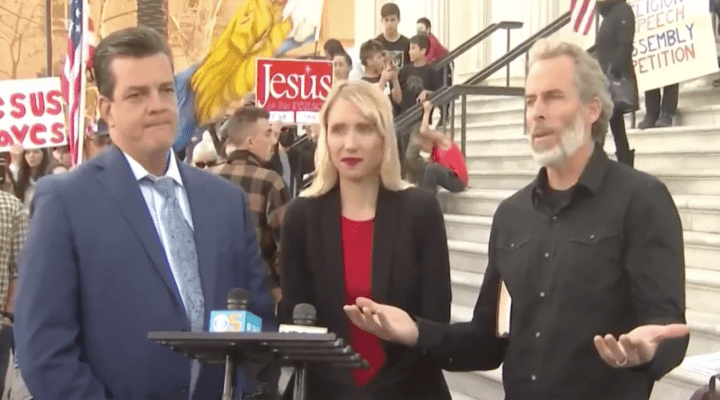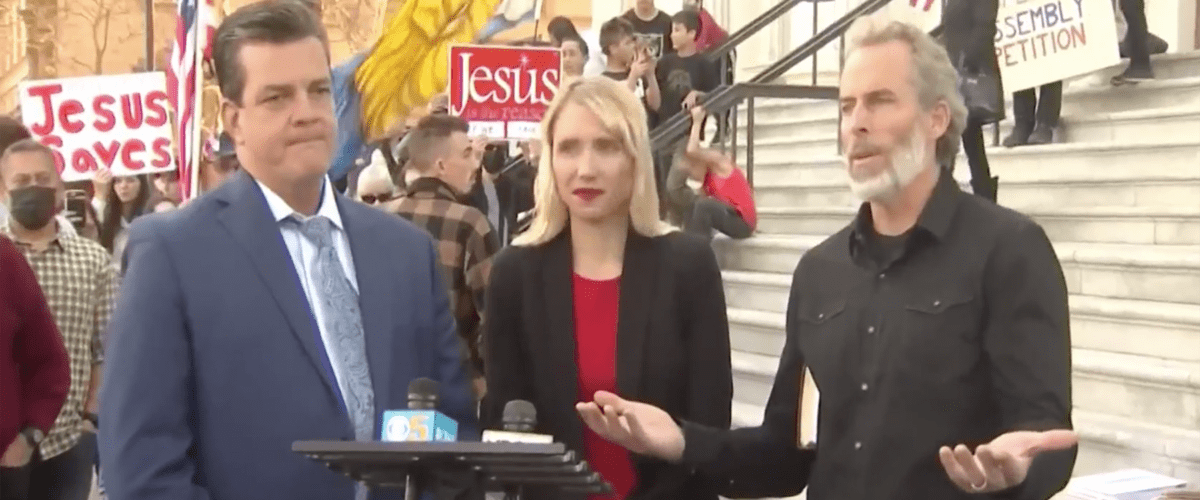California remains a hot spot not only for record-breaking spread of coronavirus but also for churches engaged in litigation over holding in-person services.
On Tuesday, Dec. 8, a Northern California church and its pastor were held in contempt of court and fined about $55,000 for repeatedly defying a court order to stop holding unmasked indoor services in violation of COVID-19 health restrictions.
NBC News reported that Mike McClure, pastor of Calvary Chapel in San Jose, Calif., responded to the fine by saying, “I respect the judge, I understand what the laws are, but there’s a bigger law.”
That echoes a recurring theme among the minority of pastors nationwide who have been fighting public health restrictions during the pandemic. Although some, like pastor John MacArthur of Grace Community Church in Los Angeles, have denied the reality of the pandemic, others have said despite the pandemic threat, the in-person worship of God must take priority.

Protesters supporting Calvary Chapel gather on the courthouse sidewalk. (Photo courtesy of Christina Aguayo News/Facebook)
In the San Jose case, the Santa Clara County district attorney sued the church in October, charging that the church had been holding indoor services with hundreds of people not wearing masks, in violation of county and state health orders. A court granted a temporary restraining order in early November, which the pastor and church ignored.
“These public health orders are literally a matter of life and death; they are designed to reduce COVID-19 transmission, avoid serious illness, and save lives,” Santa Clara County Counsel James R. Williams said in a statement.
In Southern California, MacArthur and Grace Community Church have been engaged in similar legal battles with Los Angeles County officials and — despite multiple court orders against the church — have yet to be fined for violations.
Instead, the Grace Community case continues a slow path through the legal system.
In November, Los Angeles Superior Court Judge Mitchell Beckloff agreed to allow pretrial discovery and the calling of witnesses in a contempt hearing against Grace Community Church and MacArthur. The case has been in motion since August, and the contempt case against the church is now scheduled for trial on Jan. 15 — a full five months after the legal effort to stop the church’s in-person gatherings began.
The LA Daily News reported that one of the church’s attorneys, Charles LiMandri, told the judge pretrial discovery is necessary because church officials believe the county has displayed more “animus” toward churches with its coronavirus health orders than any entity other than gyms. He said tattoo parlors and nail salons have received greater consideration than have churches.
Meanwhile, a Nov. 25 Supreme Court ruling related to New York churches may further influence the legal tangles between California churches and county and state officials. That late-night ruling on the eve of Thanksgiving Day appears to contradict a May ruling from the court — also a 5-4 decision but with the late Justice Ruth Bader Ginsburg still alive and voting in the majority — that allowed California’s governor to restrict attendance at houses of worship in order to control the spread of coronavirus.
That May ruling has been cited by the Supreme Court and lower courts as justification for allowing similar restrictions in other places. It also has been vehemently derided by a few prominent California churches that now hope for a different outcome due to Ginsburg’s death and her replacement by Amy Coney Barrett.
Last week, in light of the Thanksgiving ruling, the Supreme Court ordered a federal district court to take another look at a Southern California church’s challenge to state restrictions on indoor worship services.
The church contends that the state’s COVID-19 restrictions violate its right to freely exercise religion.
The suit was filed in the summer by Harvest Rock Church, a church with multiple campuses across the state. The church contends that the state’s COVID-19 restrictions violate its right to freely exercise religion.
As summarized on SCOTUS Blog: “The church argues that it is treated less favorably than businesses like grocery stores, malls, swap meets and card rooms, which can remain open with less stringent attendance limits — or, in the case of essential retail in the state’s least restrictive zones, with no attendance limits at all. Indeed, the church notes, it can still carry out its charitable work in its buildings.”
And in an echo of MacArthur and other conservative church leaders pushing back on public health restrictions, Harvest Rock charges that Gov. Gavin Newsom “openly encouraged” Black Lives Matter protests involving thousands of people in May and June. Despite the fact that these street protests were held outside and mainly with people wearing masks, MacArthur and others have compared the allowed protests to prohibitions on their churches holding indoor services without masks.
In the Harvest Rock case, the state has conceded that the church has “a powerful interest in worshipping in the place and manner” of its choosing but continues to assert that public health interests in the face of skyrocketing COVID transmission must take precedence over that right. The state so far has recorded 20,000 COVID-related deaths.
The California case differs from the New York case because California “applies the same restrictions to indoor worship as to comparable secular activities involving large groups gathering in close proximity indoors for prolonged periods,” the state said.
One of the key features of the New York case was the complexity of restrictions enacted and the apparent variations in treatment for similar businesses. In California’s most restrictive zones, the state prohibits indoor gatherings at movie theaters, restaurants, museums and other large spaces, as well as worship services.
Nonetheless, the Supreme Court’s Nov. 25 ruling in the New York case has heartened California pastors who oppose government restrictions on churches.
The Sacramento Bee reported that Greg Fairrington, pastor of a Rocklin, Calif., megachurch that has been defying California’s pandemic restrictions, opened services Nov. 29 by pulling out his cell phone and reading aloud from a the court decision.
“There is no world in which the Constitution tolerates a color-coded executive edict that opens liquor stores … and bike shops but shutters churches,” Fairrington said, quoting the opinion written by Justice Neil Gorsuch.
“What appeared to be a large crowd of worshippers, packed closely together, roared its approval.”
The paper reported: “The pastor then looked out at his congregants at Destiny Church and shouted: ‘The Supreme Court of the United States of America — yeah! We have a biblical mandate and First Amendment rights!’ What appeared to be a large crowd of worshippers, packed closely together, roared its approval.”
Meanwhile, the Associated Press reported that in San Diego County, “a standoff has intensified between county officials and Awaken Church, which operates five houses of worship in the San Diego area and has openly defied California restrictions.”
On Saturday, Nov. 28, the county publicly named an Awaken campus in San Diego as the source of a COVID outbreak. Then it added two other Awaken campuses, in the suburbs of San Marcos and Chula Vista, to its advisory, reporting 64 cases at all three locations.
The AP reported: “Awaken has repeatedly defied orders, also being the first entity to receive a cease-and-desist order from the county in July. That notice said authorities viewed a news station’s report of an indoor service and that failing to comply with state orders could result in misdemeanor prosecution and a $1,000 fine.”
Related articles:
What does the Supreme Court’s midnight COVID ruling really mean for religious liberty?
Noah had a quick trip compared to John MacArthur’s battle with Los Angeles County
How John MacArthur loves the Bible but not his neighbor
John MacArthur retains Trump lawyer in fight over COVID restrictions
MacArthur sues LA County, county countersues in fight over COVID restrictions


